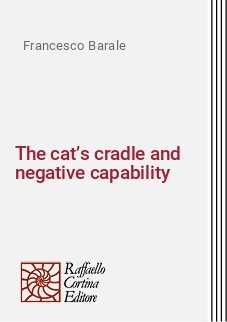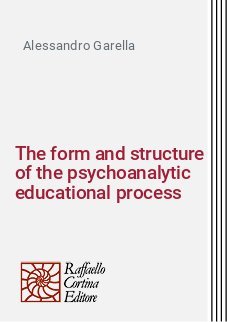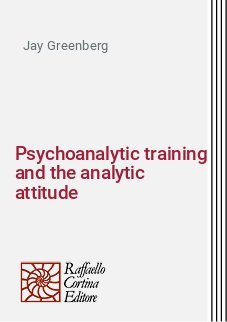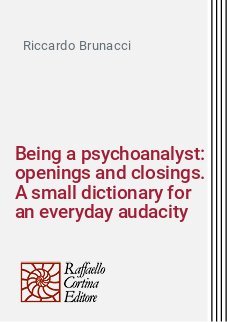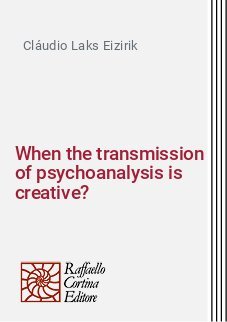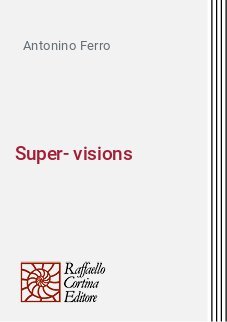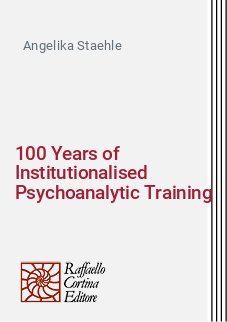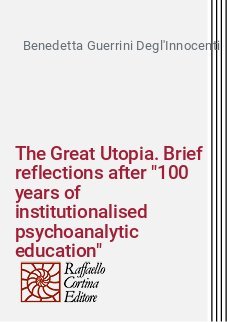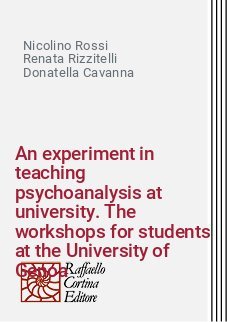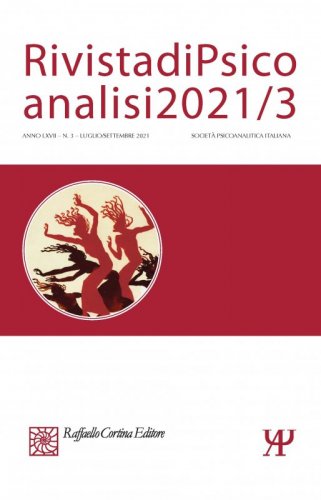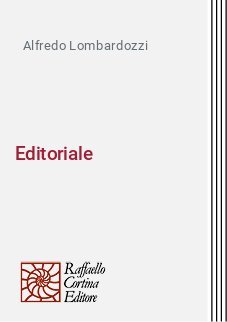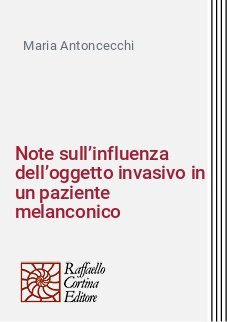Raffaello Cortina Editore
The cat’s cradle and negative capability
On paradoxes, the good and bad use of theories (and the way they are taught) in constructing and main-taining a psychoanalytic mind
rivista: La Rivista di Psicoanalisi
fascicolo: The Italian Psychoanalytic Annual Special Issue 2021
di Francesco Barale
Rivista di Psicoanalisi 2021/3
LXVII - (3) - Luglio/Settembre 2021
rivista: La Rivista di Psicoanalisi
pagine: 256
Editoriale
rivista: La Rivista di Psicoanalisi
fascicolo: Rivista di Psicoanalisi 2021/3
di Alfredo Lombardozzi
Note sull’influenza dell’oggetto invasivo in un paziente melanconico
rivista: La Rivista di Psicoanalisi
fascicolo: Rivista di Psicoanalisi 2021/3
di Maria Antoncecchi
NOTE SULL’INFLUENZA DELL’OGGETTO INVASIVO IN UN PAZIENTE MELANCONICO
Il lavoro intende descrivere come la relazione con un oggetto con caratteristiche invasive possa modificare i normali processi di sviluppo generando dolore, frammentazione e stati di confusione. Questa specifica esperienza, nelle prime fasi della vita, comporta l’incorporazione forzata di parti dell’ oggetto che vanno a confondersi con il Sé non ancora formato del bambino che si sente costantemente minacciato dalla presenza di oggetti alieni. Attraverso il caso clinico, l’A. vuole mettere in evidenza il complesso lavoro di differenziazione tra il Sé del paziente e l’oggetto invasivo e la costruzione di un ambiente affettivo sicuro che ha permesso di restituire un senso all’ esistenza del paziente.
PAROLE CHIAVE: Arresto dello sviluppo, identificazione patologica, melanconia, oggetto invasivo.
Notes on the influence of the invasive object in a melancholic patient. This contribution explores how a relationship with an object with invasive characteristics must impeded the normal developmental processes generating pain, fragmentation and confusion. This specific experience, in the early stages of life, involves the forced incorporation of parts of the object which become confused with the self not yet formed by the infant who constantly feels threatened by the presence of foreign objects. The patient I shall describe in the clinical case shows the complex work of differentiation between the patient’s self and the invasive object and the construction of a safe affective environment which allows at restoring meaning to the existence of the patient.
KEY WORDS: Impeded development, invasive object, melancholy, pathologic identification.
Notes sur l’influence de l’objet invasif chez un patient mélancolique. Le travail entend décrire comment la relation avec un objet aux caractéristiques invasives peut modifier les processus normaux de développement, générant douleur, fragmentation et états de confusion. Cette expérience spécifique, dans les premiers stades de la vie, implique l’incorporation forcée de parties de l’objet qui se confondent avec le moi non encore formé de l’enfant qui se sent constamment menacé par la présence d’objets étrangers. A travers le cas clinique, l’Auteur veut mettre en évidence le travail complexe de différenciation entre le Soi du patient et l’objet invasif et la construction d’un environnement émotionnel sécurisant qui a permis de redonner un sens à l’existence du patient.
MOTS-CLÉS: Arrêt du développement, identification pathologique, mélancolie, objet invasif.
Notas sobre la influencia del objeto invasivo en un paciente melancólico. El trabajo intenta describir cómo la relación con un objeto de características invasivas puede modificar los procesos normales de desarrollo, generando dolor, fragmentación y estados de confusión. Esta experiencia específica, en las primeras etapas de la vida, implica la incorporación forzada de partes del objeto que se fusionan con el Self aún no formado del niño que se siente constantemente amenazado por la presencia de objetos extraños. A través del caso clínico, el A. quiere resaltar el complejo trabajo de diferenciación entre el Self del paciente y el objeto invasor y la construcción de un ambiente afectivo seguro que ha permitido devolverle sentido a la existencia del paciente.
PALABRAS CLAVE: Detención del desarrollo, identificación patológica, melancolía, objeto invasor.
Anmerkungen zum Einfluss des invasiven Objekts bei einem melancholischen Patienten. Die Arbeit beabsichtigt zu beschreiben, wie die Beziehung zu einem Objekt mit invasiven Eigenschaften die normalen Entwicklungsprozesse verändern und dabei Schmerz, Fragmentierung und Verwirrungszustände hervorrufen kann. Diese spezifische Erfahrung in den ersten Lebensphasen bringt die erzwungene Inkorporation von Teilen des Objekts mit sich, die mit dem noch ungeformten Selbst des Kindes durcheinandergeraten, das sich unaufhörlich von der Präsenz fremder Objekte bedroht fühlt. Vermittels eines klinischen Falls will die Verfasserin die komplexe Arbeit der Differenzierung zwischen dem Selbst des Patienten und dem invasiven Objekt sowie den Aufbau einer sicheren emotionalen Umgebung hervorheben, die es erlaubt hat, der Existenz des Patienten einen Sinn zu geben.
SCHLÜSSELWÖRTER: Entwicklungsstillstand, pathologische Identifizierung, Melancholie, invasives Objekt.
 ita
ita
 Eng
Eng


